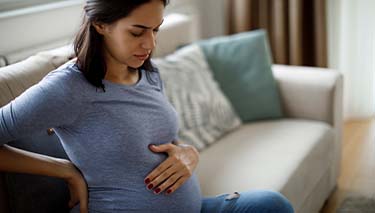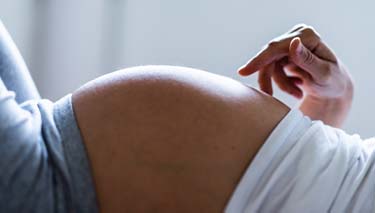Every woman is an individual and unique. Genetics, gender, age, environment, diet, exercise, occupation, lifestyle factors and metabolism all play a role in what any of us weigh and how much weight we gain or lose over our lifetimes.
Most women who are within an average height and weight range at the start of their pregnancy can expect to gain between 10-15 kilograms over the full 40 weeks of gestation. This can be more in cases of multiple pregnancy or if there are pregnancy complications.
The majority of pregnant women have a very small weight gain within their first trimester and some will even lose weight. Nausea, combined with changes in the normal eating pattern, can mean a weight loss of up to a couple of kilograms. However, during the second and third trimesters, most women regain what they may have lost and gradually start to gain more.
But don't I have to eat for two?
The old saying of pregnant women needing to eat for two has no scientific basis. In fact, doubling portion sizes and increasing food volume during pregnancy is not only unnecessary, it can be dangerous. What is needed is not so much an increase in food intake, but enhancing nutrition quality. These are two very separate issues. During the first trimester, daily kilojoule intake should stay around the same as before pregnancy.
Most pregnant women only need to increase their kilojoule intake by around 10 percent. Current scientific evidence is clear that women who are overweight before conceiving or who gain excess weight during pregnancy can struggle to get back to a healthy weight range after their baby is born. Check your individual Body Mass Index (BMI) for your total recommended weight gain during pregnancy. For more information see this guide from the Australian Government.
What's a BMI?
Some maternity care providers use the BMI (body mass index) tool to estimate an ideal weight gain. This is a measurement of an individual's body fat which is worked out using a mathematical formula i.e., Weight in kilograms divided by height in metres squared. An average BMI is between 19-25. Having a high or low BMI can influence the advice offered by care providers regarding how much food a pregnant woman should (ideally) be eating each day.
Where does the extra weight come from?
Pregnancy weight gain can be divided into how much the mother contributes to her overall gain and what her baby does. It is considered fairly normal for most women to gain around 3 kilograms of extra body fat over the course of a normal pregnancy. Extra weight deposits around their thighs, hips, bottom and arms act as reservoirs or energy stores which can be used by her body during breastfeeding.
Maternal weight gain comes from:
- Extra circulating blood volume.
- Water retention and general fluid increase.
- Extra weight of the breasts.
- Extra weight of the expanding uterus.
- Amniotic fluid and placenta.
- The baby (at birth an average weight is around 3.3-3.5 kilograms).
In the early stages of pregnancy, most maternal weight gain is as a result of changes within the mother, rather than the baby. More blood is produced to support the growing foetus and to supply the oxygen and nutrients it relies on to grow. And although it's normal to have an increased appetite, look for food quality, not quantity.
It is normal for there to be fluctuations and changes in a pregnant mother's weight gain. But any sudden increase or decrease can be cause for concern. This is why many maternity care providers monitor the weight gain of their clients as it is an indicator of some complications. However, some mothers are only weighed at the beginning and end of their pregnancy. A lot of pregnant women like to keep a check on their weight themselves and the best way to do this is with a weekly weigh, at around the same time of the day. The ideal way to gain pregnancy weight is slowly and steadily.
Sudden increases or decreases need to be checked by your maternity care provider. In a normal and uncomplicated pregnancy, there is only a small weight gain if any, in the first trimester. Most women then gain around 700 grams 1 kilogram per week until the last 1-2 weeks when weight gain tends to slow down.
How long will it take to lose it?
Many experts agree that it is fair to assume what took 9 months to gain, will take around the same period of time to lose. Some women just drop their pregnancy weight so quickly, they are back in their pre-pregnancy clothes within a couple of weeks of giving birth. Others take longer and some women report they never return to their pre-pregnancy weight. It is rarely helpful to compare pregnancy weight gain or losses.
The same basic maths for losing weight at any other time, applies equally after birth. The more energy which is taken into the body in the form of food (fuel) the more needs to be used up. Too much food for the amount which is being used is stored as fat. To lose excess weight requires attention to portion control and some form of daily exercise. Be realistic about losing post pregnancy weight, especially if you are breastfeeding your baby. Limiting food can impact on breast milk supply.
What about dieting?
Pregnancy is not a time for any woman to diet. Kilojoule restriction can lead to malnutrition and may affect the baby's growth. There is also an increased incidence of neonatal death and low birth weight babies in women who diet during their pregnancy. Losing weight too quickly after birth can lead to problems with low lactation and flagging energy levels.
Being underweight during pregnancy can lead to problems with
- Having a baby which is small for dates and underweight at birth.
- Increased risk of premature delivery and the associated problems with having a pre-term baby.
- Potential problems with lactation and low breast milk supply.
Having a BMI which is too low, or being very underweight can lead to problems conceiving. A normal menstrual cycle is dependent on having a healthy ratio of fat to lean muscle and an adequate daily food intake.
Risks of being overweight during pregnancy
- Higher risk of complications with labour and delivery.
- Giving birth to an overweight baby who may have problems regulating their blood sugar levels.
- Haemorrhoids, stretch marks, pelvic floor problems, urinary incontinence.
- Feeling more uncomfortable and becoming intolerant of the heat.
- Backaches, leg aches, swollen feet and ankles and problems with mobility.
- Raised blood pressure and higher incidence of Pre-Eclampsia. An increased risk of developing gestational diabetes.
- Extra strain on the vital organs such as the heart, liver and kidneys.
- Higher incidence of insulin resistance and type 2 diabetes.
The best advice regarding weight gain during pregnancy is to think in terms of the quality of the food you are eating, rather than the quantity. While your baby is in your uterus, they will depend on you for nutrients and the ideal conditions they need to grow and thrive.
When a pregnant woman is carrying too much fat, there can be changes in the way her body works. This can impact on her energy levels, mood and general health. Excess weight can also increase the risk of pregnancy and birth complications.
Learn to listen your body's signals when you have eaten enough and are sufficiently full. Try to think in terms of being satiated during meals, that is, your hunger is satisfied and you do not need to eat any more. Avoid missing meals as this can put your body into a starvation mode which leads to issues with metabolism and low energy.
Speak with a dietician if you are concerned about your weight.
Edited and reviewed by Jane Barry, Midwife and Child Health Nurse July 2021.


Last Published* May, 2024
*Please note that the published date may not be the same as the date that the content was created and that information above may have changed since.





















